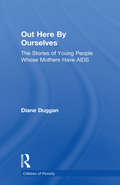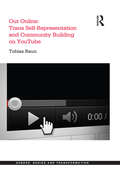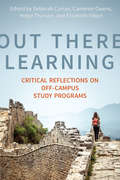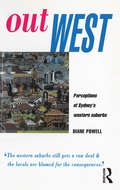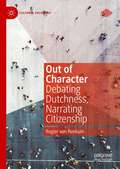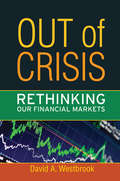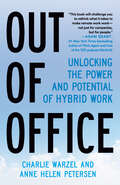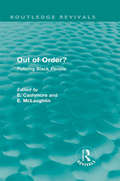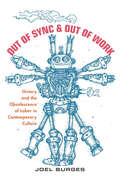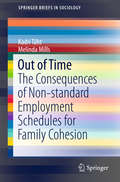- Table View
- List View
Out Here By Ourselves: The Stories of Young People Whose Mothers Have AIDS (Children of Poverty)
by Diane DugganFirst published in 2001. Routledge is an imprint of Taylor & Francis, an informa company.
Out Online: Trans Self-Representation and Community Building on YouTube (Gender, Bodies and Transformation)
by Tobias RaunTrans people are increasingly stepping out of the shadow of pathologization and secretiveness to tell their life stories, share information and to connect with like-minded others, using YouTube as a platform. Out Online: Trans Self-Representation and Community Building on YouTube explores the digital revolution of trans video blogging, addressing ’trans’ in its many meanings and configurations to examine the different ways in which the body in transformation and the vlog as a medium intersect. Drawing on rich, virtual ethnographic studies of trans video blogging, the author sheds light on the ways in which the video blog (or ’vlog’) as a multimodal medium enables trans people to tell their stories with the use of sound, text, music, and pictures - thus offering new ways to construct and archive bodily changes, and to revise the story endlessly. A groundbreaking study of the intersection between trans identity and technology, Out Online explores the transformative and therapeutic potential of the video blog as a means by which trans vloggers can emerge and develop online, using the vlog as a site for creation, intervention, community building and resistance. As such, it will appeal to social scientists and scholars of cultural and media studies with interests in gender, sexuality and embodiment.
Out Our Way: Gay and Lesbian Life in the Country
by Michael RiordonMichael Riordon celebrates the survival of ordinary, extraordinary people whose experiences are rarely reflected in the media. These stories of courage and humour were gathered in the course of two years and 27,000 kilometres of travel, and some three hundred in-person conversations.
Out There Learning: Critical Reflections on Off-Campus Study Programs
by Deborah Louise Curran Cameron Owens Helga Thorson Elizabeth VibertUniversities across North America and beyond are experiencing growing demand for off-campus, experiential learning. Exploring the foundations of what it means to learn "out there," Out There Learning is an informed, critical investigation of the pedagogical philosophies and practices involved in short-term, off-campus programs or field courses. Bringing together contributors’ individual research and experience teaching or administering off-campus study programs, Out There Learning examines and challenges common assumptions about pedagogy, place, and personal transformation, while also providing experience-based insights and advice for getting the most out of faculty-led field courses. Divided into three sections that investigate aspects of pedagogy, ethics of place, and course and program assessment, this collection offers "voices from the field" highlighting the experiences of faculty members, students, teaching assistants, and community members engaged in every aspect of an off-campus study programs. Several chapters examine study programs in the traditional territories of Indigenous communities and in the Global South. Containing an appendix highlighting some examples of off-campus study programs, Out There Learning offers new pathways for faculty, staff, and college and university administrators interested in enriching the experience of non-traditional avenues of study.
Out West: Perceptions Of Sydney's Western Suburbs
by Diane PowellThis is the story of Sydney's much maligned western suburbs: how the city spread across the plains to the Blue Mountains, and why the 'westie' stigma haunts the people of the region.Resourceful and innovative, the people of the western suburbs have created a culture of their own, defying the 'westie' stigma. Out West uncovers the intricate social and cultural networks that make western Sydney a dynamic and stimulating place to live.Out West looks at how the land of the Darug people of the Cumberland Plain was first settled by whites in colonial times. It then traces the development of the 'westie' stigma from the time of inner-city slum clearances to post-war immigration and the more recent waves of moral panic about the youth of the region. It focuses in particular upon the way in which the media have contributed to the maintenance of the 'westie' image.
Out in Africa: LGBT Organizing in Namibia and South Africa (Social Movements, Protest and Contention #38)
by Ashley CurrierVisibility matters to activists—to their social and political relevance, their credibility, their influence. But invisibility matters, too, in times of political hostility or internal crisis. Out in Africa is the first to present an intimate look at how Namibian and South African lesbian, gay, bisexual, and transgender (LGBT) organizations have cultivated visibility and invisibility as strategies over time. As such, it reveals the complexities of the LGBT movements in both countries as these organizations make use of Western terminology and notions of identity to gain funding even as they work to counter the perception that they are &“un-African.&”Different sociopolitical conditions in Namibia and South Africa affected how activists in each country campaigned for LGBT rights between 1995 and 2006. Focusing on this period, Ashley Currier shows how, in Namibia, LGBT activists struggled against ruling party leaders&’ homophobic rhetoric and how, at the same time, black LGBT citizens of South Africa, though enjoying constitutional protections, greater visibility, and heightened activism, nonetheless confronted homophobic violence because of their gender and sexual nonconformity.As it tells the story of the evolving political landscape in postapartheid Namibia and South Africa, Out in Africa situates these countries&’ movements in relation to developments in pan-African LGBT organizing and offers broader insights into visibility as a social movement strategy rather than simply as a static accomplishment or outcome of political organizing.
Out in Culture: Gay, Lesbian and Queer Essays on Popular Culture
by Corey K. Creekmur Alexander DotyOut in Culture charts some of the ways in which lesbians, gays, and queers have understood and negotiated the pleasures and affirmations, as well as the disappointments, of mass culture. The essays collected here, combining critical and theoretical works from a cross-section of academics, journalists, and artists, demonstrate a rich variety of gay and lesbian approaches to film, television, popular music, and fashion. This wide-ranging anthology is the first to juxtapose pioneering work in gay and lesbian media criticism with recent essays in contemporary queer cultural studies.Uniquely accessible, Out in Culture presents such popular writers as B. Ruby Rich, Essex Hemphill, and Michael Musto as well as influential critics such as Richard Dyer, Chris Straayer, and Julia Lesage, on topics ranging from the queer careers of Agnes Moorehead and Pee Wee Herman to the cultural politics of gay drag, lesbian style, the visualization of AIDS, and the black snap! queen experience. Of particular interest are two "dossiers," the first linking essays on the queer content of Alfred Hitchcock's films, and the second on the production and reception of popular music within gay and lesbian communities. The volume concludes with an extensive bibliography--the most comprehensive currently available--of sources in gay, lesbian, and queer media criticism.Out in Culture explores the distinctive and original ways in which gays, lesbians, and queers have experienced, appropriated, and resisted the images and artifacts of popular culture. This eclectic anthology will be of interest to a broad audience of general readers and scholars interested in gay and lesbian issues; students of film, media, gender, and cultural studies; and those interested in the emerging field of queer theory.Contributors. Sabrina Barton, Edith Becker, Rhona J. Berenstein, Nayland Blake, Michelle Citron, Danae Clark, Corey K. Creekmur, Alexander Doty, Richard Dyer, Heather Findlay, Jan Zita Grover, Essex Hemphill, John Hepworth, Jeffrey Hilbert, Lucretia Knapp, Bruce La Bruce, Al LaValley, Julia Lesage, Michael Moon, Michael Musto, B. Ruby Rich, Marlon Riggs, Arlene Stein, Chris Straayer, Anthony Thomas, Mark Thompson, Valerie Traub, Thomas Waugh, Patricia White, Robin Wood
Out in Sport: The experiences of openly gay and lesbian athletes in competitive sport
by Eric Anderson Rory Magrath Rachael BullinghamResearch has shown that since the turn of the millennia, matters have rapidly improved for gays and lesbians in sport. Where gay and lesbian athletes were merely tolerated a decade ago, today they are celebrated. This book represents the most comprehensive examination of the experiences of gays and lesbians in sport ever produced. Drawing on interviews with openly gay and lesbian athletes in the US and the UK, as well as media accounts, the book examines the experiences of ‘out’ men and women, at recreational, high school, university and professional levels, in addition to those competing in gay sports leagues. Offering a new approach to understanding this important topic, Out in Sport is essential reading for students and scholars of sport studies, LGBT studies and sociology, as well as sports practitioners and trainers.
Out in the Country: Youth, Media, and Queer Visibility in Rural America (Intersections #2)
by Mary L. GrayWinner of the 2009 Ruth Benedict Prize for Outstanding Monograph from the Society of Lesbian and Gay AnthropologistsWinner of the 2010 Distinguished Book Award from the American Sociological Association, Sociology of Sexualities SectionWinner of the 2010 Congress Inaugural Qualitative Inquiry Book Award Honorable MentionAn unprecedented contemporary account of the online and offline lives of rural LGBT youthFrom Wal-Mart drag parties to renegade Homemaker’s Clubs, Out in the Country offers an unprecedented contemporary account of the lives of today’s rural queer youth. Mary L. Gray maps out the experiences of young people living in small towns across rural Kentucky and along its desolate Appalachian borders, providing a fascinating and often surprising look at the contours of gay life beyond the big city. Gray illustrates that, against a backdrop of an increasingly impoverished and privatized rural America, LGBT youth and their allies visibly—and often vibrantly—work the boundaries of the public spaces available to them, whether in their high schools, public libraries, town hall meetings, churches, or through websites. This important book shows that, in addition to the spaces of Main Street, rural LGBT youth explore and carve out online spaces to fashion their emerging queer identities. Their triumphs and travails defy clear distinctions often drawn between online and offline experiences of identity, fundamentally redefining our understanding of the term ‘queer visibility’ and its political stakes. Gray combines ethnographic insight with incisive cultural critique, engaging with some of the biggest issues facing both queer studies and media scholarship. Out in the Country is a timely and groundbreaking study of sexuality and gender, new media, youth culture, and the meaning of identity and social movements in a digital age.
Out of Character
by Piercarlo Valdesolo David DestenoHave you ever wondered why a trumpeter of family values would suddenly turn around and cheat on his wife? Why jealousy would send an otherwise level-headed person into a violent rage? What could drive a person to blow a family fortune at the blackjack tables? Or have you ever pondered what might make Mr. Right leave his beloved at the altar, why hypocrisy seems to be rampant, or even why, every once in awhile, even you are secretly tempted, to lie, cheat, or steal (or, conversely, help someone you never even met)? This book answers these questions and more, and in doing so, turns the prevailing wisdom about who we are upside down. Our character, argue psychologists DeSteno and Valdesolo, isn't a stable set of traits, but rather a shifting state that is subject to the constant push and pull of hidden mechanisms in our mind. And it's the battle between these dueling psychological forces that determine how we act at any given point in time. Drawing on the surprising results of the clever experiments concocted in their own laboratory, DeSteno and Valdesolo shed new scientific light on so many of the puzzling behaviors that regularly grace the headlines. For example, you'll learn: * Why Tiger Woods just couldn't resist the allure of his mistresses even though he had a picture-perfect family at home. And why no one, including those who knew him best, ever saw it coming. * Why even the shrewdest of investors can be tempted to gamble their fortunes away (and why risky financial behavior is driven by the same mechanisms that compel us to root for the underdog in sports). * Why Eliot Spitzer, who made a career of crusading against prostitution, turned out to be one of the most famous johns of all time. * Why Mel Gibson, a noted philanthropist and devout Catholic, has been repeatedly caught spewing racist rants, even though close friends say he doesn't have a racist bone in his body. * And why any of us is capable of doing the same, whether we believe it or not!A surprising look at the hidden forces driving the saint and sinner lurking in us all, Out of Character reveals why human behavior is so much more unpredictable than we ever realized. From the Hardcover edition.
Out of Character: Debating Dutchness, Narrating Citizenship (Cultural Sociology)
by Rogier van ReekumThis book offers a detailed and innovative study of the Dutch case of politics of citizenship and nationalism by focusing on public and political controversies in the crucial period of 1973–2015. By foregrounding the crucial role of performance and narration in public and political debates, this book shows how discourses of citizenship and nationhood are deeply shaped by established repertoires and long-lasting lines of disagreement about difference and belonging in the Netherlands. While change did occur within the Dutch context during this period, this book reveals that these transformations were not primarily driven by purportedly permissive and accommodating responses to immigration and cultural diversity. Instead, it unveils a Dutch landscape deeply marked by challenges related to race, democracy, and liberal exceptionalism. In doing so, the book contributes to ongoing debates in the study of citizenship, nationalism, and intellectual history around the merits and limitations of liberal politics of inclusion. It critically extends concepts and arguments in cultural pragmatics and problematizes the common hope that public debate may progressively resolve antagonisms over difference. With a focus on empirical research, the book meticulously reconstructs the emergence of national identity debates in recent decades and vividly portrays the dynamics and tensions of these public performances while dissecting their role in shaping the nation's identity and its boundaries. The book covers a crucial period of the European politics of citizenship and nationhood in which anti-immigrant politics, new modes of racism, and the bordering of Europe took shape. It locates the Dutch case within these developments and insists on the importance of historical continuity and narrative performance. This book demonstrates that the Netherlands, and Europe more broadly, has not overcome the profound consequences of its past.
Out of Crisis: Rethinking Our Financial Markets
by David A. WestbrookFormer Federal Reserve chair Greenspan recently said that the risk management paradigm is broken; thus our understanding of financial regulation no longer makes sense. More generally, the current financial crisis obliges us to rethink the relationships among "financial markets" and "governments." In Out of Crisis financial analyst David Westbrook illuminates the intellectual, business, and policy errors that have led us into the present morass. Through a vivid legal and political analysis he shows how the ideologies of the right and left have distorted financial thinking and policy. Learning from these errors, the book sketches the emergence of a new understanding of risk management and bureaucratic regulation. Out of Crisis begins the tasks of rethinking the structures that constitute financial markets and exploring how such structures may be strengthened. Taking responsibility for the markets we build to do so much of our society's work, we may yet become mature capitalists.
Out of Eden: The Peopling Of The World
by Stephen OppenheimerIn a brilliant synthesis of genetic, archaeological, linguistic and climatic data, Oppenheimer challenges current thinking with his claim that there was only one successful migration out of Africa. In 1988 Newsweek headlined the startling discovery that everyone alive on the earth today can trace their maternal DNA back to one woman who lived in Africa 150,000 years ago. It was thought that modern humans populated the world through a series of migratory waves from their African homeland. Now an even more radical view has emerged, that the members of just one group are the ancestors of all non-Africans now alive, and that this group crossed the mouth of the Red Sea a mere 85,000 years ago. It means that not only is every person on the planet descended from one African 'Eve' but every non-African is related to a more recent Eve, from that original migratory group. This is a revolutionary new theory about our origins that is both scholarly and entertaining, a remarkable account of the kinship of all humans.Further details of the findings in this book are presented at www.bradshawfoundation.com/stephenoppenheimer/
Out of Eden: The Peopling Of The World
by Stephen OppenheimerIn a brilliant synthesis of genetic, archaeological, linguistic and climatic data, Oppenheimer challenges current thinking with his claim that there was only one successful migration out of Africa. In 1988 Newsweek headlined the startling discovery that everyone alive on the earth today can trace their maternal DNA back to one woman who lived in Africa 150,000 years ago. It was thought that modern humans populated the world through a series of migratory waves from their African homeland. Now an even more radical view has emerged, that the members of just one group are the ancestors of all non-Africans now alive, and that this group crossed the mouth of the Red Sea a mere 85,000 years ago. It means that not only is every person on the planet descended from one African 'Eve' but every non-African is related to a more recent Eve, from that original migratory group. This is a revolutionary new theory about our origins that is both scholarly and entertaining, a remarkable account of the kinship of all humans.Further details of the findings in this book are presented at www.bradshawfoundation.com/stephenoppenheimer/
Out of Love for My Kin: Aristocratic Family Life in the Lands of the Loire, 1000–1200
by Amy LivingstoneIn Out of Love for My Kin, Amy Livingstone examines the personal dimensions of the lives of aristocrats in the Loire region of France during the eleventh and twelfth centuries. She argues for a new conceptualization of aristocratic family life based on an ethos of inclusion. Inclusivity is evident in the care that medieval aristocrats showed toward their families by putting in place strategies, practices, and behaviors aimed at providing for a wide range of relatives. Indeed, this care--and in some cases outright affection--for family members is recorded in the documents themselves, as many a nobleman and woman made pious benefactions "out of love for my kin." In a book made rich by evidence from charters--which provide details about life events including birth, death, marriage, and legal disputes over property--Livingstone reveals an aristocratic family dynamic that is quite different from the fictional or prescriptive views offered by literary depictions or ecclesiastical sources, or from later historiography. For example, she finds that there was no single monolithic mode of inheritance that privileged the few and that these families employed a variety of inheritance practices. Similarly, aristocratic women, long imagined to have been excluded from power, exerted a strong influence on family life, as Livingstone makes clear in her gender-conscious analysis of dowries, the age of men and women at marriage, lordship responsibilities of women, and contestations over property. The web of relations that bound aristocratic families in this period of French history, she finds, was a model of family based on affection, inclusion, and support, not domination and exclusion.
Out of Office: The Big Problem and Bigger Promise of Working from Home
by Anne Helen Petersen Charlie WarzelThe future isn&’t about where we will work, but how. For years we have struggled to balance work and life, with most of us feeling overwhelmed and burned out because our relationship to work is broken. This &“isn't just a book about remote work. It's a book that helps us imagine a future where our lives—at the office and home—are happier, more productive, and genuinely meaningful&” (Charles Duhigg, bestselling author of The Power of Habit).Out of Office is a book for every office worker – from employees to managers – currently facing the decision about whether, and how, to return to the office. The past two years have shown us that there may be a new path forward, one that doesn&’t involve hellish daily commutes and the demands of jam-packed work schedules that no longer make sense. But how can we realize that future in a way that benefits workers and companies alike? Based on groundbreaking reporting and interviews with workers and managers around the world, Out of Office illuminates the key values and questions that should be driving this conversation: trust, fairness, flexibility, inclusive workplaces, equity, and work-life balance. Above all, they argue that companies need to listen to their employees – and that this will promote, rather than impede, productivity and profitability. As a society, we have talked for decades about flexible work arrangements; this book makes clear that we are at an inflection point where this is actually possible for many employees and their companies. Out of Office is about so much more than zoom meetings and hybrid schedules: it aims to reshape our entire relationship to the office.
Out of Order?: Policing Black People (Routledge Revivals)
by E. Cashmore E. McLaughlinFirst published in 1991, this book evaluates and compares the problematic relationships that have sometimes existed between police and Afro-Caribbean people in Britain and in the United States of America. Contributors from both sides of the Atlantic assess conflicting claims from police and black communities, as to whether some police are racist or too brutal in their operations. Although this book was written in the early 90s, many of the issues discussed remain interesting and relevant to our society today.
Out of Place: Social Exclusion and Mennonite Migrants in Canada
by Luann Good GingrichThe flow of migrants from south to north and east to west carries with it growing concerns about the economic integration, political incorporation, and social inclusion of newcomers and their children. But what happens when a group of people deliberately excludes themselves from mainstream society? How can social policies, human services, and communities best understand and respond to them? In Out of Place, Luann Good Gingrich explores social inclusion and exclusion in relation to the approximately 60,000 Low German-speaking Mennonites who have migrated from traditionally self-sufficient and agrarian colonies in Latin America to rural areas of Canada. By examining the free-market principles that organize the human services industry the author exposes the inherent conflict that arises when this "market logic" is imposed on a group that does not embrace these ideals. The author's innovative approach to social policy and human services which emphasizes the relationship between dominant and subordinate cultures, encourages us to find new ways to authentically engage with difference and bridge the gaps that divide us.
Out of Sync & Out of Work: History and the Obsolescence of Labor in Contemporary Culture
by Joel BurgesOut of Sync & Out of Work explores the representation of obsolescence, particularly of labor, in film and literature during a historical moment in which automation has intensified in capitalist economies. Joel Burges analyzes texts such as The Invention of Hugo Cabret, Wreck-It Ralph, Fantastic Mr. Fox, and Iron Council, and examines their “means” of production. Those means include a range of subjects and narrative techniques, including the “residual means” of including classic film stills in a text, the “obstinate means” of depicting machine breaking, the “dated means” of employing the largely defunct technique of stop-motion animation, and the “obsolete” means of celebrating a labor strike. In every case, the novels and films that Burges scrutinizes call on these means to activate the reader’s/viewer’s awareness of historical time. Out of Sync & Out of Work advances its readers’ grasp of the complexities of historical time in contemporary culture, moving the study of temporality forward in film and media studies, literary studies, critical theory, and cultural critique.
Out of Time
by Melinda Mills Kadri TähtThis pioneering work aims at understanding the impact of non-standard (evening, night, weekend) working time on family cohesion, meaning parent-child interaction, partnership quality and divorce or partnership dissolution. 'Out of time - the Consequences of Non-standard Employment Schedules for Family Cohesion' is the first work to treat this important topic in a cross-national, comparative way by using data from two large comparable surveys. The impact of work in non-standard schedules on workers can be divided into individual and social consequences. Research so far has shown the clear individual effects of these schedules, such as increased stress levels and sleeping and physical disorders. There is less clarity about social consequences. Either no or positive effects of these types of schedules on workers and their families are found, or a significant negative impact on the relations between the workers and others, especially other members of the family is shown in research results. This Brief compares the Netherlands and the United States of America, countries that both show a high prevalence of non-standard schedule work, whereas both operate in very different institutional and welfare regime settings of working time regulation. By combining both quantitative and qualitative data, the authors are able to provide generalized views of comparative surveys and challenging those generalizations at the same time, thus enabling the reader to get a better understanding and more balanced view of the actual relationship between non-standard employment schedules and family cohesion.
Out of the Ashes: Rebuilding American Culture
by Anthony M. EsolenWhat do you do when an entire civilization is crumbling around you? You do everything. This is a book about how to get started.Providence College professor Anthony Esolen, blunt and prophetic, makes the case that the decay of Western civilization is alarmingly advanced. Our sickly, sub-pagan state resembles a bombed-out city.We have to assess the damage, but merely lamenting it does no good. There is work to be done.The first step is the restoration of truth. America’s most powerful institutions-including the government-are mass producers of deceit. We have to recognize the lies and clear our minds of cant.Our culture produces only the drab or the garish. We must restore beauty-in art, architecture, music, and worship.There are two things wrong with our schools-everything our children don’t learn in them, and everything they do learn. Public schools are beyond reform; we have to start over.Our universities are as bad as our schools. A few can be saved, but for the most part, we must build new ones. In fact, this is already being done. We have to support these efforts as if our children’s souls depended on it.Repudiating the Sexual Revolution, that prodigious engine of misery, requires more than zipping up. The modern world has made itself ignorant about sex-in particular that there are two of them and they’re profoundly different. We must restore manhood and womanhood.In our servile economy, we raise bureaucrats not craftsmen. We must rediscover how to make things that are beautiful and lasting-the products of human work. And we must dispense with the "rent-seekers”-the proliferating middlemen whose own work contributes nothing.We have turned sports into a job for our children. Instead of playing we "work out.” A genuine civilization is based on celebration. We must restore play to human life, seeing all the other days of the week in light of the Sabbath.The gigantic scale of government has made us a nation of "idiots,” incapable of attending to public affairs and the common good. We must insist that the Constitution is not whatever judges say it is, complying with but not obeying their edicts while we reclaim our freedom of religion one outdoor procession, one public lecture, one parish picnic at a time.We must love this world, but we have here no abiding city. The great division is between those who place all their hope in the present life and those who know that we are pilgrims. There is no retreat, but take courage-we have our map. Let us begin.
Out of the Classroom and into the World
by Salvatore VascellaroBank Street College of Education professor Salvatore Vascellaro is a leading advocate of taking children and teachers into a wider world as the key to improving our struggling schools.Combining practical and theoretical guidance, Out of the Classroom and into the World visits a rich variety of classrooms transformed by innovative field trip curricula--showing how students' hearts and minds are opened as they discover how a suspension bridge works, what connects them to the people and places of their neighborhood, and as they come to understand the ecosystem of a river by following it to its source. Vascellaro shows, equally, that what teachers can offer children is fueled by their own engagement with the world, and he offers stunning examples of teachers awakened by their direct experiences with the social issues plaguing American society--from the flood-torn areas of New Orleans to the mining areas of West Virginia.Based on the core principles of progressive pedagogy, and the wisdom gained from Vascellaro's experience as a teacher, school administrator, and teacher educator, Out of the Classroom and into the World is a direct retort to test scores and standards as adequate measures of teaching and learning--an inspiring call and major new resource for anyone interested in reinvigorating America's classrooms.
Out of the Darkness: The Germans, 1942-2022
by Frank TrentmannOne of The Telegraph&’s 50 Best Books of 2023A gripping and nuanced history of the German people from the Second World War to the present day, including hugely revealing new primary source material on every aspect of its transformation.In 1945, Germany lay ruined. Its citizens stood condemned by history, responsible for a horrifying genocide and war of extermination. But by the end of Angela Merkel&’s tenure in 2021, Germany looked like the moral voice of Europe, welcoming over one million refugees, holding together the tenuous threads of the European Union, and making military restraint the center of its foreign policy. At the same time, its rigid fiscal discipline and energy deals with Russian leader Vladimir Putin have cast a shadow over the present. Innumerable scholars have asked how Germany could have degenerated from a nation of scientists, poets, and philosophers into one responsible for genocide. And yet, until now, a similarly vital question has been ignored. That is, how did a nation whose past has been marked by mass murder, a people who cheered Adolf Hitler, reinvent themselves?Trentmann tells this dramatic story from the middle of the Second World War, through the Cold War and the division of East and West, to the fall of the Berlin Wall and Germany&’s struggle to find its place in the world today. This journey includes a series of internal, moral conflicts: admissions of guilt and shame vying with immediate economic concerns, restitution for some but not others, tolerance versus racism, compassion versus complicity. Through a range of voices—German soldiers and German Jews; displaced persons in limbo; East German women and shopkeepers angry about energy shortages; opponents and supporters of nuclear power; volunteers helping migrants and refugees, and right-wing populists attacking them—Trentmann paints a remarkable and surprising portrait of the German people over eighty years, showing how they became who they are today.
Out of the Darkness: The Germans, 1942-2022
by Frank Trentmann#1 Most Important Political Book of 2023, Sueddeutsche Zeitung (Germany)A Best Book of 2023, The Telegraph (Great Britain)A gripping and nuanced history of the German people from World War II to the war in Ukraine, including revealing new primary source material on Germany's transformationIn 1945, Germany lay in ruins, morally and materially. Its citizens stood condemned by history, responsible for a horrifying genocide and war of extermination. But by the end of Angela Merkel&’s tenure as chancellor in 2021, Germany looked like the moral voice of Europe, welcoming more than one million refugees, holding together the tenuous threads of the European Union, and making military restraint the center of its foreign policy. At the same time, Germany's rigid fiscal discipline and energy deals with Vladimir Putin have cast a shadow over the present. Innumerable scholars have asked how Germany could have degenerated from a nation of scientists, poets, and philosophers into one responsible for genocide. This book raises another vital question: How did a nation whose past has been marked by mass murder, a people who cheered Adolf Hitler, reinvent themselves, and how much?Trentmann tells this dramatic story of the German people from the middle of World War II through the Cold War and the division into East and West to the fall of the Berlin Wall and the struggle to find a place in the world today. This journey is marked by a series of extraordinary moral conflicts: admissions of guilt and shame vying with immediate economic concerns; restitution for some but not others; tolerance versus racism; compassion versus complicity. Through a range of voices—German soldiers and German Jews; displaced persons in limbo; East German women and shopkeepers angry about energy shortages; opponents and supporters of nuclear power; volunteers helping migrants and refugees, and right-wing populists attacking them—Trentmann paints a remarkable and surprising portrait spanning eighty years of the conflicted people at the center of Europe, showing how the Germans became who they are today.
Out of the Darkness: The Mystery of Aaron Rodgers
by Ian O'ConnorInstant New York Times Bestseller"A masterwork. ... O'Connor answers every question, deftly and deeply, that we've had about the most controversial person in America's biggest game." —Peter KingFour-time New York Times bestselling sport biographer Ian O’Connor pulls back the curtain on four-time NFL MVP Aaron Rodgers, delivering the definitive portrait of the legendary yet mysterious quarterback who has astonished, befuddled, yet always captivated fans of America’s #1 sport.Aaron Rodgers is among the two or three most talented players to ever hold the most important job in American team sports – quarterback. He also stands as the most mysterious and polarizing figure in the modern-day national pastime that is professional football.From his controversial Covid stance to his methods of spiritual awakening to his estrangement from his family to his high-profile romances to his devastating Achilles injury a mere four plays into his New York Jets career, Rodgers has long dominated the NFL’s news cycle.At thirty-nine, in search of a challenge that would rejuvenate him, Rodgers divorced the iconic Green Bay Packers of Vince Lombardi fame for the Jets, who have not appeared in a Super Bowl since Neil Armstrong stepped on the moon. The trade made Rodgers the biggest story in the biggest league in the biggest market. By far.That story only got bigger when Rodgers shockingly went down on the night of 9/11, in front of a packed house that roared for him when he took the field carrying an American flag, and in front of the biggest Monday Night Football audience in ESPN history, peaking at more than 25 million viewers across all platforms. Rodgers then shocked the world by pulling off the fastest recorded comeback from an Achilles tear, returning to practice eleven weeks after surgery. Remarkably enough, he would have played again in the 2023 season, at age 40, had the Jets remained in playoff contention.Ian O’Connor uses hundreds of original interviews to pull back the curtain and answer the most penetrating questions about the league’s most enigmatic player. Just like he did in his defining bios of Bill Belichick, Mike Krzyzewski, Derek Jeter, Jack Nicklaus, and Arnold Palmer, O’Connor reveals all sides of an all-time great and delivers a portrait of a complex man that will forever shape the way he is viewed.
